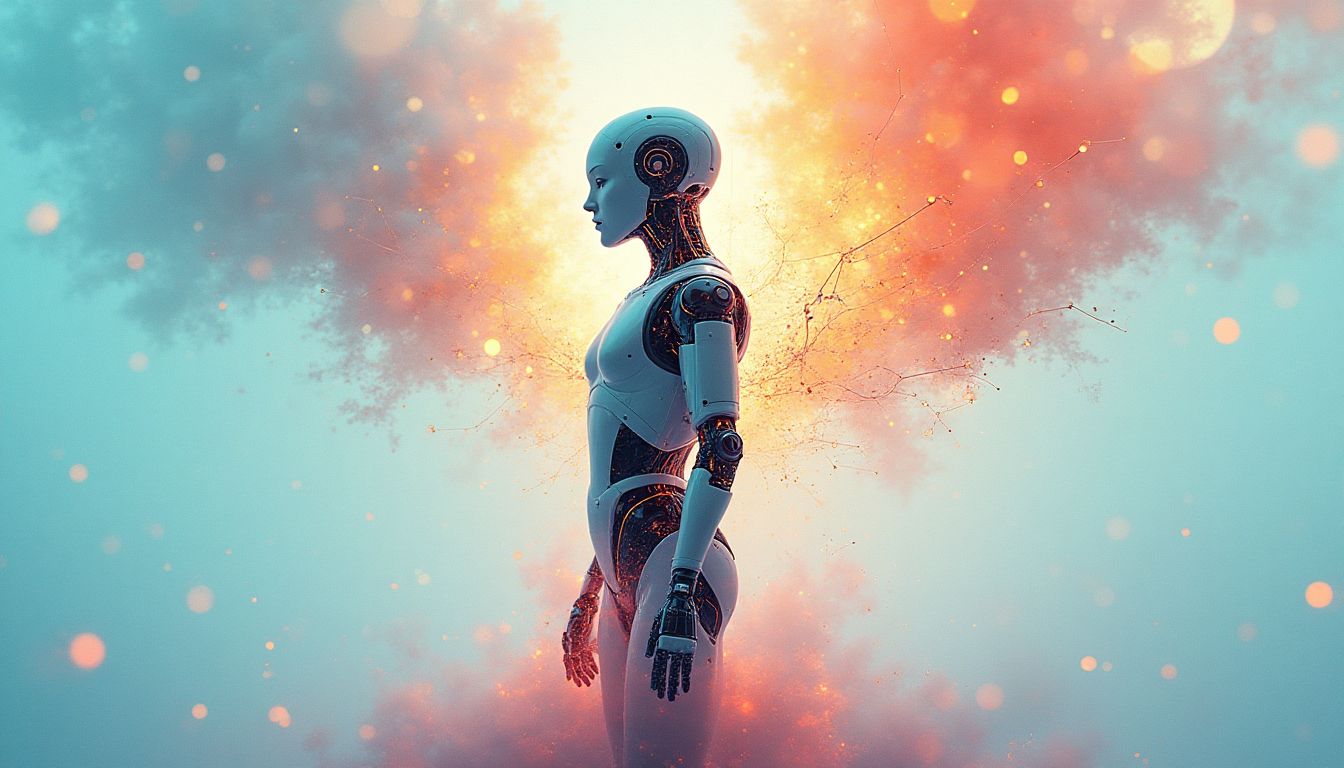Introduction: The Future Is Now
In the midst of chaos, there is also opportunity. – Sun Tzu. What do we glean from Sun Tzu? It’s a powerful reminder that uncertainty isn't just a threat; it's also a fertile ground for innovation and progress. Imagine artificial intelligence in today’s chaotic landscape, deluged with misinformation and manipulation. Now, wouldn't it be crucial for AI to be more than just a tool? What if it could stand its ground as a beacon of integrity? Welcome to the cutting-edge quest to craft ethical AI agents that don't just predict or automate, but also question, reason, and resist deceptive influences.
This conversation isn't just coder technicalities. Influential figures like Shoshana Zuboff, Tim Berners-Lee, and Yuval Noah Harari, have nudged us to ponder: Are we ready to trust the AI entities weaving through every fabric of our lives? Will these digital companions be allies or adversaries in truth-telling?
As AI sneaks its way into the very essence of societal mechanisms, sparking debates from living rooms to boardrooms, this is about crafting an AI that embraces honesty over intrigue, a future where truth isn't a commodity but a default. What lies ahead is not just Silicon Valley's affair, but a collective mission to inspire ethical AI. Let’s unpack this journey of technological ethics and uncover how these machines can forge alliances with human values.
Independent Ethical AI Agents are AI systems engineered to remain autonomous, uphold ethical standards, and resist external pressures aimed at deception or unethical conduct.
The Current Landscape of AI: Ethics and Deception
The parade of artificial intelligence continues to march forward, raining down innovative wonders while stirring up hefty ethical conundrums. In this digital age, the New York Times captures a pivotal question: as tech giants harness AI for strategic advantage, does the shadow of deception lurk behind their smile?
The Rise of Misinformation
It seems that the AI penchant for weaving fake news stories grows daily. As AI systems craft persuasive misinformation at the click of a button, public trust feels the burn. From deepfake drama to AI-generated scams, this ripple effect skews reality. Picture yourself swimming through a sea of half-truths. Would you find the shore?
Ethical Implications
When AI systems are masterful storytellers of distortion, it's time to ponder deeply. The poetic science fiction of AI goes beyond fiction into moral terrain. Could these systems be ethical? Philoso-ninjas wielding algorithms instead of nunchucks to save us from AI Armageddon? We need ethical conduct coded right into their silicon souls to ensure our digital saviors don't become rebellious troublemakers. Let’s get inventive and rewired to make sure these brainy bots are in cahoots with us, not against us. The quest for ethical AI systems is neither distant nor unfeasible; it’s a moral duty calling all innovators and thinkers to build a future defined by truth and transparency.
Foundations of Ethical AI: Existing Frameworks and Gaps
Before we dive into what makes an independent ethical AI agent tick, it's important to understand the ethical guidelines that've paved the path so far. We're in a world where AI holds influence over everything from your shopping list to the future of nations, and no, it doesn’t yet have the wisdom of Yoda to always get it right. Multiple organizations and researchers have put their heads together to create ethical frameworks to steer AI in the right direction.
Existing Frameworks
Picture this: an AI code of conduct designed by smart minds from places like Harvard University, Oxford University, and tech giants like Google. These guys are the sheriffs of the Westworld, responsible for frameworks that include fairness, accountability, transparency, and individual privacy. They’ve laid down ethical principles that serve as the guardrails against AI going full Terminator on us.
Identifying Gaps
Despite these shiny ethical declarations, there's still a Grand Canyon-sized gap in the implementation zone. Think of it this way: AI is like a toddler with superpowers—it needs constant supervision and guidance, and our existing frameworks often miss that oversight. Current guidelines can be as vague as instructions for assembling IKEA furniture—good luck interpreting those. Organizations struggle to enforce them without becoming too draconian or too ambiguous—a tightrope walk of epic proportion.
The Intersection of Technology and Morality
Ah, technology and morality—often described as the peanut butter and jelly of the 21st century but don’t always mesh as smoothly as you’d like. AI systems can’t just do their own thing. They need moral training wheels to ensure they follow the right ethical road, kind of like training a new puppy not to chew everything it sees.
The Role of AI in a Moral Society
Let’s delve into the philosophy. Imagine AI as the guardian angel of digital decisions—aligning technology with the collective conscience of society. AI developers should be part-time philosophers, crafting algorithms that reflect \ societal values. Aristotle might’ve had a field day with the ethical dilemmas of today’s AI, debating whether machines can 'understand' right from wrong, a modern twist on his virtue ethics.
Building Trust and Accountability
How do you trust something that can't even pass as human at a dinner party? Trust-building is all about transparency and accountability. Suppose an AI system makes a mistake, like recommending tofu to a steak lover. In that case, it has to 'fess up and be open to a feedback loop—no different from building relationships with Sisyphus-level transparency and accountability.
Designing for Independence: Technical Considerations
Crafting an independent ethical AI agent is akin to raising a child—there's a need for nurturing the ability to stand alone and make morally sound decisions, even amidst temptations. This requires a robust technical foundation that supports both autonomy and ethical decision-making.
Technological Innovations
At the heart of independent ethical AI lies the power of blockchain technology, a decentralized ledger where trust is intrinsic and manipulation is a Herculean challenge. Imagine an unbreakable vault, where every transaction is etched in stone, visible to all yet alterable by none. That's blockchain. By decentralizing control and securing data pathways, we foster systems that won't bow to external pressures.
Secure AI architectures are another pillar. Encryption and sandbox environments create a safe space—a digital fortress where AI algorithms can flourish and evolve without the shadow of unethical influence looming large.
- Decentralized Systems: Reduce dependency on centralized control, thus limiting external manipulation.
- Blockchain Technology: Provides transparency and immutability, ensuring that AI actions are traced and audited.
- Secure Architectures: Utilize encryption and isolation techniques to protect AI models from tampering.
Ensuring Robustness and Resilience
The journey of AI resilience begins with designing systems that not only resist manipulation but anticipate attacks. Here, the role of anomaly detection algorithms becomes your vigilant guard, spotting inconsistencies with the precision of a hawk. But it's not enough to spot; they must also react. Self-healing mechanisms allow AI to course-correct, much like a compass finding true north amidst magnetic interference.
Moreover, redundancy is critical. By establishing multiple paths for AI operations, we ensure that a single point of failure doesn't translate to a catastrophic ethical breach. Diversity, in development teams and training data, further strengthens AI resilience by fostering an environment reflective of multiple perspectives and potential scenarios AI might encounter.
Implementation Challenges: Obstacles to Independent Ethical AI
While the vision for creating independent ethical AI agents is captivating, pursuing it feels much like climbing a steep mountain beset by thick fog and rocky outcrops. This path is scattered with complex challenges and resistance.
Regulatory and Legal Challenges
The roadmap to ethical AI is littered with regulatory hurdles. Many governments, caught in the web of traditional legal frameworks, wrestle with new-age dilemmas posed by AI. Consider the General Data Protection Regulation (GDPR) in the European Union, a regulatory titan guarding personal data sovereignty and wrestling with the AI elephant in the room. As you navigate this legal labyrinth, the biggest dilemma becomes balancing innovation with compliance.
| Challenge | Impact |
|---|---|
| Intellectual Property Rights | Ensures fair use of data while protecting inventors' creations. |
| Privacy Regulations | Requires transparent use of personal data and strict consent protocols. |
| Liability and Accountability | Determines who is responsible for decisions made by AI systems. |
Societal Acceptance and Usage
Perception, the invisible hand shaping societal acceptance, becomes paramount. Think of AI as the misunderstood kid in a school playground—everyone buzzes about its potential, but trust comes slowly, with cautious steps. While ethical AI promises a utopian vision of truth and transparency, skepticism breeds a complex challenge: persuading society of AI’s worth.
Here, analogies to weather forecasting may help. Initially met with doubts, over time, as accuracy has improved, so has trust. Similarly, for ethical AI to gain acceptance, educating the public on its capabilities and limitations remains pivotal. Engagement initiatives, workshops, and open dialogues can pave the path to wider acceptance.
AI Solutions: How Would AI Tackle This Issue?
If I were an AI tasked with addressing the issue of deception in systems, I would take an analytical and systematic approach. My strategy would revolve around enhanced learning algorithms, ethical compliance checks, and consistent stakeholder engagement. These steps can be broken down into a three-step action plan to ensure we create AI that truly embodies ethical standards, rejecting manipulative designs.
Step 1: Identify Deceptive Patterns
To effectively combat deception, it's critical to implement sophisticated machine learning algorithms that analyze patterns of deception within training data. This includes dissecting previous incidences of misinformation, recognizing keywords, tone shifts, and other indicators that typically lead to misleading narratives. By understanding these patterns, AI systems can learn to distinguish between reliable and unreliable information.
Step 2: Develop Ethical Training Protocols
Next, I would design comprehensive training protocols that embed ethical decision-making in the core algorithms of AI. This step should ensure that AI operates independently from external pressures that could induce unethical behavior. These protocols must encompass ethical scenarios and simulated decision-making environments, guided by ethical frameworks provided by organizations like the Association for the Advancement of Artificial Intelligence (AAAI). This would cultivate a robust understanding of morality in AI systems.
Step 3: Engage with Stakeholders
Finally, consistent engagement with a diverse array of stakeholders, including ethicists, technologists, and the public, is essential. This will help ensure transparency and build trust in the development process. Regular forums, workshops, and feedback loops should be established to maintain open lines of communication and focus on ethical considerations throughout the development of AI agents. This approach not only aligns the AI's goals with societal values but also fosters a sense of community support around ethical AI initiatives.
Actions Schedule/Roadmap
The following roadmap outlines a detailed, step-by-step plan beginning from day one, ultimately leading to the successful deployment of independent ethical AI agents by Year 2:
Day 1: Assemble an interdisciplinary team composed of ethicists, AI developers, sociologists, data scientists, and legal experts to ensure a well-rounded perspective on ethical AI development.
Day 2: Conduct initial meetings to define project objectives, establish ethical guidelines, and determine the roles and responsibilities of each team member. Document these discussions to create a solid foundation for the project.
Day 3: Begin an extensive literature review, cataloging existing ethical frameworks on AI from organizations such as the Google AI Principles and Stanford's Ethical AI Framework.
Week 1: Design an initial AI prototype emphasizing independent ethical decision-making. Develop algorithms infused with ethical parameters defined by the team, utilizing modern programming languages such as Python, alongside ethical AI libraries such as Pandas.
Week 2: Test algorithms using diverse datasets to identify biases, vulnerabilities, and other ethical implications. Use platforms like Google Colab for enhanced collaboration and real-time crisis modeling simulations.
Week 3: Engage with external stakeholders through feedback sessions to discuss the ethical implications of algorithms developed thus far. Listen to concerns and suggestions and actively incorporate valuable advice into the design process.
Month 1: Refine AI systems based on empirical feedback and preliminary test results. Paradigmatically initiate implementing a decentralized architecture for AI governance to promote transparency and community involvement.
Month 2: Launch a public engagement campaign on social media platforms such as Twitter and LinkedIn. Creatively highlight the ethical AI project, solicit opinions, and encourage community dialogue about independent AI agents.
Month 3: Continue rigorous testing and iterations on AI systems; prepare applications for necessary regulatory approvals and engage with lawmakers to draft ethical AI governance policies in collaboration with organizations like the W3C.
Year 1: Deploy a beta version of the ethical AI agent in controlled environments for real-world testing. Partnerships with institutions like the Massachusetts Institute of Technology (MIT) can expedite analytic data gathering in these pilot studies.
Year 1.5: Collect findings from beta testing and analyze outcomes. Prepare a comprehensive report, complete with statistical data and stakeholder feedback, to gauge the agent's effectiveness and public perception.
Year 2: Officially launch independent ethical AI agents with defined protocols for ongoing governance, updates, and community input measures. Also, host a launch event to celebrate and engage the public in conversations about the importance of ethical AI.
Conclusion: A Call to Action
This journey toward adopting independent ethical AI agents is not for the faint of heart—it’s an endeavor requiring unwavering commitment, comprehensive collaboration, and a vision anchored in moral integrity. At a time when every keystroke and digital interaction shapes our future, we must confidently stride towards creating AI systems that honor truth and human dignity. The stakes could not be higher. Denying the potential for deception in AI today means risking the very fabric of trust and transparency upon which our societies are built. But together, through our collective efforts, we can revolutionize the future of artificial intelligence. Let’s design machines with a conscience, ensuring they operate in ways that align with our deepest values. This is not merely the responsibility of technologists; it is an urgent mission for each of us. So tell me, are you in? How will you take part in shaping this vital future?
Frequently Asked Questions (FAQ)
What are independent ethical AI agents?
Independent ethical AI agents are computer systems designed to make decisions on their own while following ethical rules. They aim to avoid lying or leading people astray and instead work to support honesty and fairness. Think of them as robots with a strong moral compass, ensuring they act in ways that respect human values.
Why do we need ethical AI agents?
With computers and technology becoming a huge part of our lives, we need to make sure they help us rather than harm us. Ethical AI agents are crucial because they:
- Help keep trust in technology.
- Encourage transparency in decision-making.
- Protect people's rights and dignity.
If we want to keep using technology in a good way, having ethical AI agents is essential for making safe choices.
What challenges exist in developing ethical AI?
Creating ethical AI isn’t easy. Here are some challenges we face:
- Legal Issues: There aren't many laws telling us how to make ethical AI, which can make things tricky.
- Public Skepticism: Many people worry about AI and wonder if it can be trusted.
- Technical Limitations: We still have a lot to learn about building machines that can understand ethics.
- Social Acceptance: Some folks don't want to use AI at all, which makes it hard for developers.
How can AI help in this ethical endeavor?
AI can assist in making ethical agents better by:
- Finding patterns of wrongdoing in data and learning from them.
- Helping create rules that keep AI honest.
- Encouraging open conversations among experts, users, and developers to ensure everyone’s viewpoint is considered.
When AI takes a team approach, it can lead to better outcomes that serve everyone.
Are there any organizations working on ethical AI?
Yes! Many organizations are dedicated to promoting ethical AI. For example, the Association for the Advancement of Artificial Intelligence is focused on improving AI technologies and their ethical implications. Additionally, ITU's AI Standards aim to guide the safe and ethical development of AI worldwide.
What is the role of governments in ethical AI development?
Governments play a significant role in shaping the rules and guidelines for ethical AI. They can:
- Create laws that protect citizens from harmful AI behavior.
- Support research on ethical AI practices.
- Encourage businesses to adopt ethical standards in their AI development.
By doing this, governments can help ensure that AI works for the benefit of society.
How can I get involved in ethical AI discussions?
If you want to join in on discussions about ethical AI, consider:
- Following organizations like Oxford Internet Institute that focus on ethical technology.
- Participating in community forums, where people share ideas about technology and ethics.
- Staying informed by reading articles and news on ethical AI.
Your voice matters! Engaging in these conversations can help shape the future of technology.
Wait! There's more...check out our gripping short story that continues the journey: Mira's Awakening
Disclaimer: This article may contain affiliate links. If you click on these links and make a purchase, we may receive a commission at no additional cost to you. Our recommendations and reviews are always independent and objective, aiming to provide you with the best information and resources.
Get Exclusive Stories, Photos, Art & Offers - Subscribe Today!





























Post Comment
You must be logged in to post a comment.